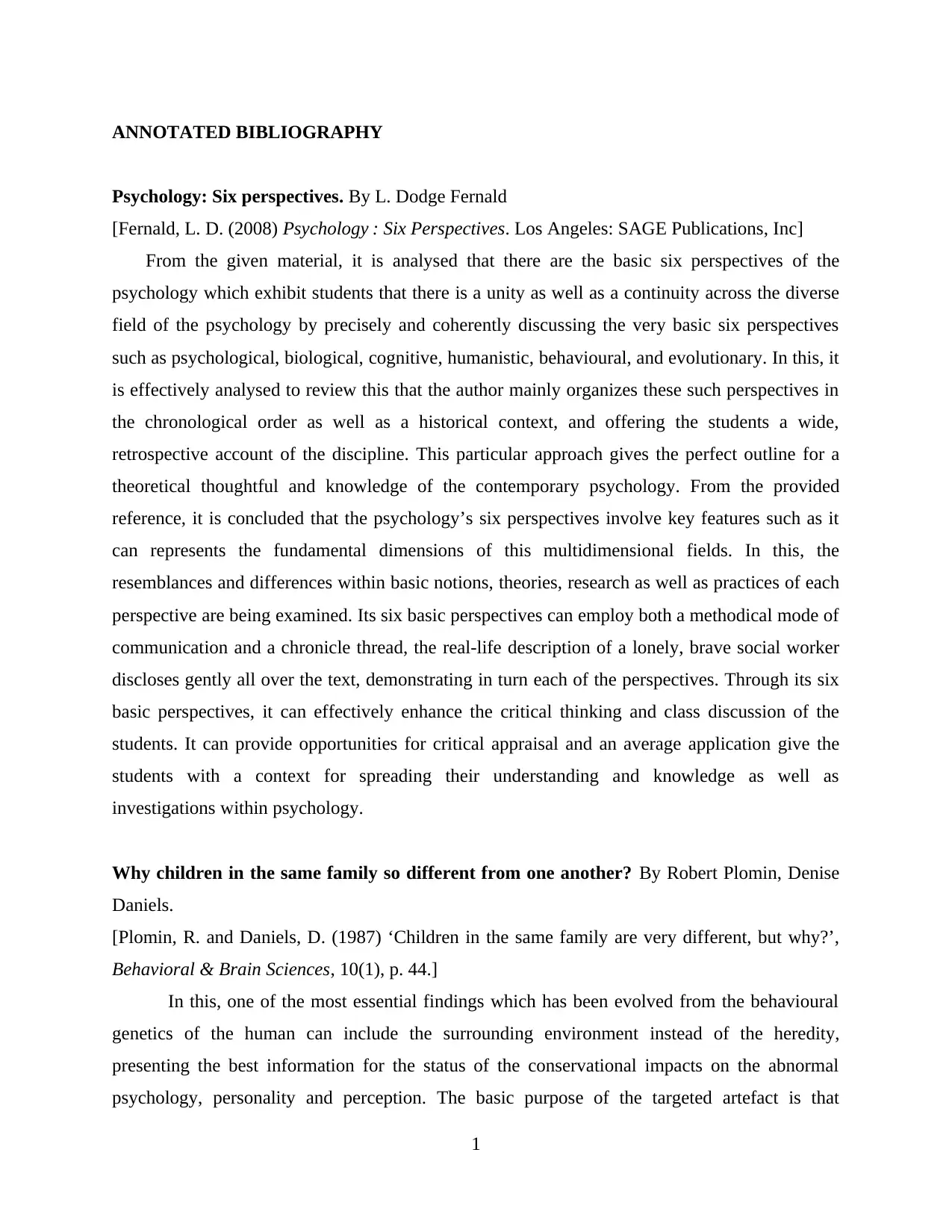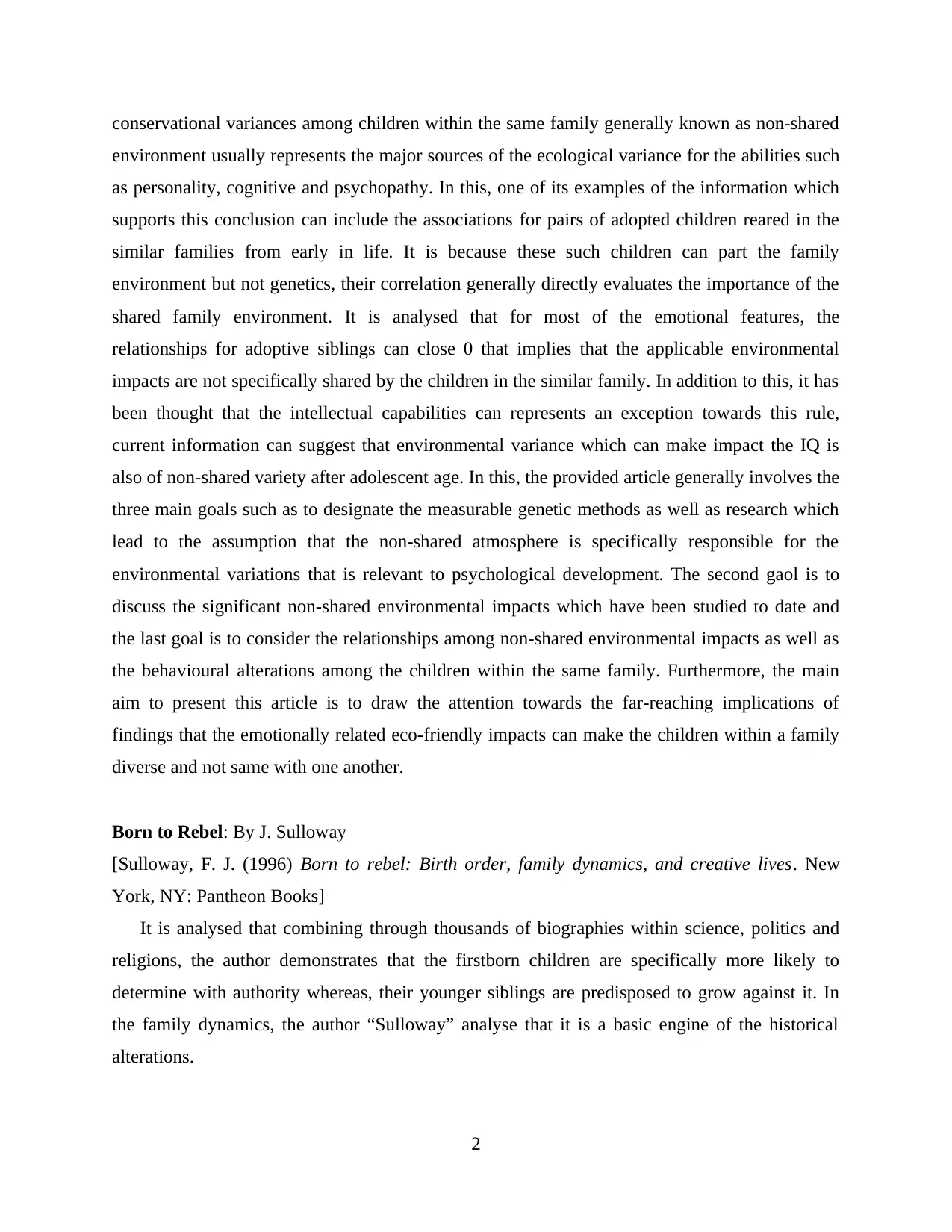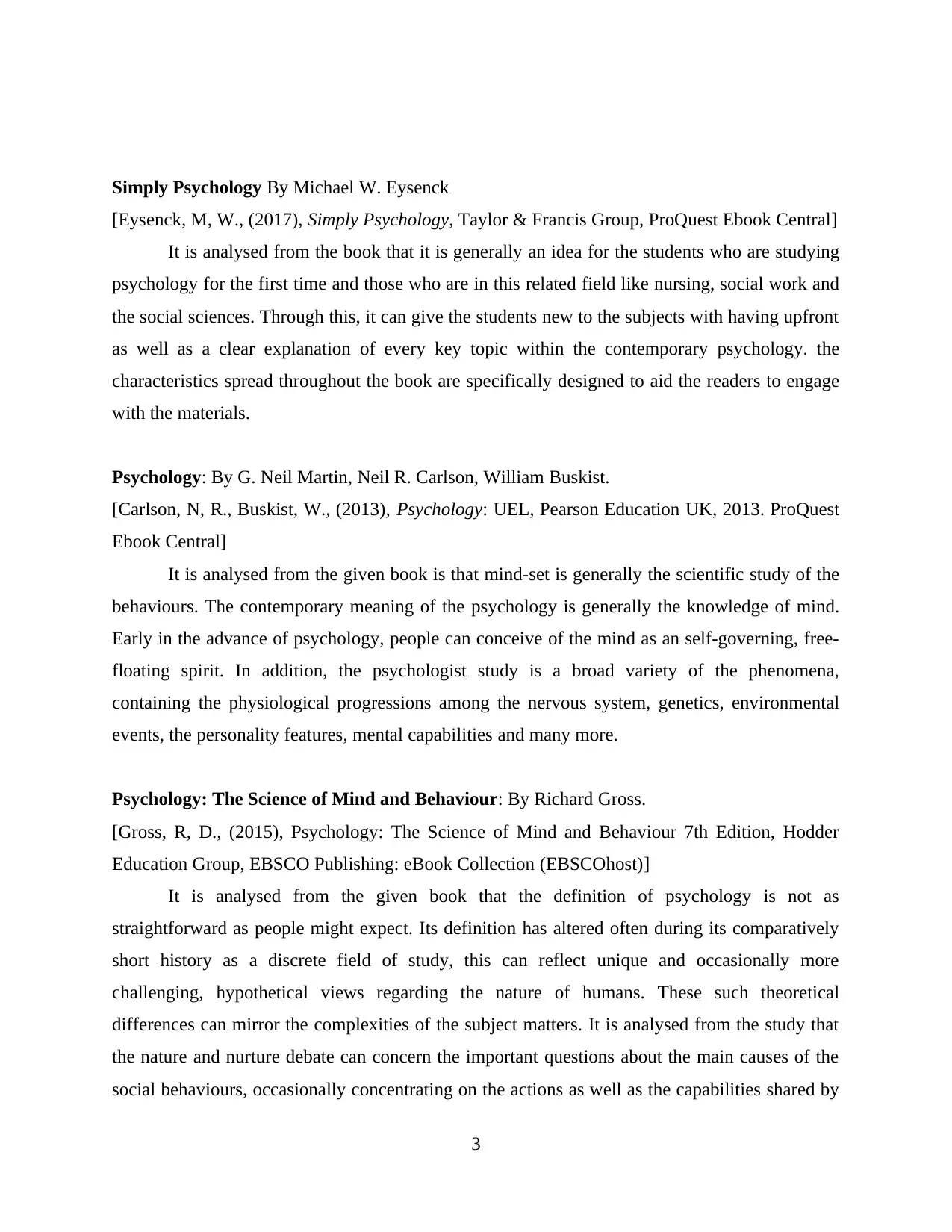HSC Annotated Bibliography: Exploring Key Psychology Theories
VerifiedAdded on 2023/06/14
|6
|1325
|472
Annotated Bibliography
AI Summary
This annotated bibliography explores key perspectives and concepts within the field of psychology, particularly relevant to Health and Social Care. It includes summaries and analyses of several significant works, such as L. Dodge Fernald's "Psychology: Six Perspectives," which examines psychological, biological, cognitive, humanistic, behavioral, and evolutionary viewpoints. The bibliography also covers Robert Plomin and Denise Daniels' research on environmental influences on child development, J. Sulloway's work on birth order and family dynamics, and general psychology texts by Michael W. Eysenck, G. Neil Martin, Neil R. Carlson, William Buskist and Richard Gross. The annotations highlight the main themes, research methodologies, and conclusions of each source, providing a comprehensive overview of diverse perspectives and influential studies within psychology.

For Health and Social Care.
Paraphrase This Document
Need a fresh take? Get an instant paraphrase of this document with our AI Paraphraser

Table of Content.
ANNOTATED BIBLIOGRAPHY..................................................................................................1
ANNOTATED BIBLIOGRAPHY..................................................................................................1

ANNOTATED BIBLIOGRAPHY
Psychology: Six perspectives. By L. Dodge Fernald
[Fernald, L. D. (2008) Psychology : Six Perspectives. Los Angeles: SAGE Publications, Inc]
From the given material, it is analysed that there are the basic six perspectives of the
psychology which exhibit students that there is a unity as well as a continuity across the diverse
field of the psychology by precisely and coherently discussing the very basic six perspectives
such as psychological, biological, cognitive, humanistic, behavioural, and evolutionary. In this, it
is effectively analysed to review this that the author mainly organizes these such perspectives in
the chronological order as well as a historical context, and offering the students a wide,
retrospective account of the discipline. This particular approach gives the perfect outline for a
theoretical thoughtful and knowledge of the contemporary psychology. From the provided
reference, it is concluded that the psychology’s six perspectives involve key features such as it
can represents the fundamental dimensions of this multidimensional fields. In this, the
resemblances and differences within basic notions, theories, research as well as practices of each
perspective are being examined. Its six basic perspectives can employ both a methodical mode of
communication and a chronicle thread, the real-life description of a lonely, brave social worker
discloses gently all over the text, demonstrating in turn each of the perspectives. Through its six
basic perspectives, it can effectively enhance the critical thinking and class discussion of the
students. It can provide opportunities for critical appraisal and an average application give the
students with a context for spreading their understanding and knowledge as well as
investigations within psychology.
Why children in the same family so different from one another? By Robert Plomin, Denise
Daniels.
[Plomin, R. and Daniels, D. (1987) ‘Children in the same family are very different, but why?’,
Behavioral & Brain Sciences, 10(1), p. 44.]
In this, one of the most essential findings which has been evolved from the behavioural
genetics of the human can include the surrounding environment instead of the heredity,
presenting the best information for the status of the conservational impacts on the abnormal
psychology, personality and perception. The basic purpose of the targeted artefact is that
1
Psychology: Six perspectives. By L. Dodge Fernald
[Fernald, L. D. (2008) Psychology : Six Perspectives. Los Angeles: SAGE Publications, Inc]
From the given material, it is analysed that there are the basic six perspectives of the
psychology which exhibit students that there is a unity as well as a continuity across the diverse
field of the psychology by precisely and coherently discussing the very basic six perspectives
such as psychological, biological, cognitive, humanistic, behavioural, and evolutionary. In this, it
is effectively analysed to review this that the author mainly organizes these such perspectives in
the chronological order as well as a historical context, and offering the students a wide,
retrospective account of the discipline. This particular approach gives the perfect outline for a
theoretical thoughtful and knowledge of the contemporary psychology. From the provided
reference, it is concluded that the psychology’s six perspectives involve key features such as it
can represents the fundamental dimensions of this multidimensional fields. In this, the
resemblances and differences within basic notions, theories, research as well as practices of each
perspective are being examined. Its six basic perspectives can employ both a methodical mode of
communication and a chronicle thread, the real-life description of a lonely, brave social worker
discloses gently all over the text, demonstrating in turn each of the perspectives. Through its six
basic perspectives, it can effectively enhance the critical thinking and class discussion of the
students. It can provide opportunities for critical appraisal and an average application give the
students with a context for spreading their understanding and knowledge as well as
investigations within psychology.
Why children in the same family so different from one another? By Robert Plomin, Denise
Daniels.
[Plomin, R. and Daniels, D. (1987) ‘Children in the same family are very different, but why?’,
Behavioral & Brain Sciences, 10(1), p. 44.]
In this, one of the most essential findings which has been evolved from the behavioural
genetics of the human can include the surrounding environment instead of the heredity,
presenting the best information for the status of the conservational impacts on the abnormal
psychology, personality and perception. The basic purpose of the targeted artefact is that
1
⊘ This is a preview!⊘
Do you want full access?
Subscribe today to unlock all pages.

Trusted by 1+ million students worldwide

conservational variances among children within the same family generally known as non-shared
environment usually represents the major sources of the ecological variance for the abilities such
as personality, cognitive and psychopathy. In this, one of its examples of the information which
supports this conclusion can include the associations for pairs of adopted children reared in the
similar families from early in life. It is because these such children can part the family
environment but not genetics, their correlation generally directly evaluates the importance of the
shared family environment. It is analysed that for most of the emotional features, the
relationships for adoptive siblings can close 0 that implies that the applicable environmental
impacts are not specifically shared by the children in the similar family. In addition to this, it has
been thought that the intellectual capabilities can represents an exception towards this rule,
current information can suggest that environmental variance which can make impact the IQ is
also of non-shared variety after adolescent age. In this, the provided article generally involves the
three main goals such as to designate the measurable genetic methods as well as research which
lead to the assumption that the non-shared atmosphere is specifically responsible for the
environmental variations that is relevant to psychological development. The second gaol is to
discuss the significant non-shared environmental impacts which have been studied to date and
the last goal is to consider the relationships among non-shared environmental impacts as well as
the behavioural alterations among the children within the same family. Furthermore, the main
aim to present this article is to draw the attention towards the far-reaching implications of
findings that the emotionally related eco-friendly impacts can make the children within a family
diverse and not same with one another.
Born to Rebel: By J. Sulloway
[Sulloway, F. J. (1996) Born to rebel: Birth order, family dynamics, and creative lives. New
York, NY: Pantheon Books]
It is analysed that combining through thousands of biographies within science, politics and
religions, the author demonstrates that the firstborn children are specifically more likely to
determine with authority whereas, their younger siblings are predisposed to grow against it. In
the family dynamics, the author “Sulloway” analyse that it is a basic engine of the historical
alterations.
2
environment usually represents the major sources of the ecological variance for the abilities such
as personality, cognitive and psychopathy. In this, one of its examples of the information which
supports this conclusion can include the associations for pairs of adopted children reared in the
similar families from early in life. It is because these such children can part the family
environment but not genetics, their correlation generally directly evaluates the importance of the
shared family environment. It is analysed that for most of the emotional features, the
relationships for adoptive siblings can close 0 that implies that the applicable environmental
impacts are not specifically shared by the children in the similar family. In addition to this, it has
been thought that the intellectual capabilities can represents an exception towards this rule,
current information can suggest that environmental variance which can make impact the IQ is
also of non-shared variety after adolescent age. In this, the provided article generally involves the
three main goals such as to designate the measurable genetic methods as well as research which
lead to the assumption that the non-shared atmosphere is specifically responsible for the
environmental variations that is relevant to psychological development. The second gaol is to
discuss the significant non-shared environmental impacts which have been studied to date and
the last goal is to consider the relationships among non-shared environmental impacts as well as
the behavioural alterations among the children within the same family. Furthermore, the main
aim to present this article is to draw the attention towards the far-reaching implications of
findings that the emotionally related eco-friendly impacts can make the children within a family
diverse and not same with one another.
Born to Rebel: By J. Sulloway
[Sulloway, F. J. (1996) Born to rebel: Birth order, family dynamics, and creative lives. New
York, NY: Pantheon Books]
It is analysed that combining through thousands of biographies within science, politics and
religions, the author demonstrates that the firstborn children are specifically more likely to
determine with authority whereas, their younger siblings are predisposed to grow against it. In
the family dynamics, the author “Sulloway” analyse that it is a basic engine of the historical
alterations.
2
Paraphrase This Document
Need a fresh take? Get an instant paraphrase of this document with our AI Paraphraser

Simply Psychology By Michael W. Eysenck
[Eysenck, M, W., (2017), Simply Psychology, Taylor & Francis Group, ProQuest Ebook Central]
It is analysed from the book that it is generally an idea for the students who are studying
psychology for the first time and those who are in this related field like nursing, social work and
the social sciences. Through this, it can give the students new to the subjects with having upfront
as well as a clear explanation of every key topic within the contemporary psychology. the
characteristics spread throughout the book are specifically designed to aid the readers to engage
with the materials.
Psychology: By G. Neil Martin, Neil R. Carlson, William Buskist.
[Carlson, N, R., Buskist, W., (2013), Psychology: UEL, Pearson Education UK, 2013. ProQuest
Ebook Central]
It is analysed from the given book is that mind-set is generally the scientific study of the
behaviours. The contemporary meaning of the psychology is generally the knowledge of mind.
Early in the advance of psychology, people can conceive of the mind as an self-governing, free-
floating spirit. In addition, the psychologist study is a broad variety of the phenomena,
containing the physiological progressions among the nervous system, genetics, environmental
events, the personality features, mental capabilities and many more.
Psychology: The Science of Mind and Behaviour: By Richard Gross.
[Gross, R, D., (2015), Psychology: The Science of Mind and Behaviour 7th Edition, Hodder
Education Group, EBSCO Publishing: eBook Collection (EBSCOhost)]
It is analysed from the given book that the definition of psychology is not as
straightforward as people might expect. Its definition has altered often during its comparatively
short history as a discrete field of study, this can reflect unique and occasionally more
challenging, hypothetical views regarding the nature of humans. These such theoretical
differences can mirror the complexities of the subject matters. It is analysed from the study that
the nature and nurture debate can concern the important questions about the main causes of the
social behaviours, occasionally concentrating on the actions as well as the capabilities shared by
3
[Eysenck, M, W., (2017), Simply Psychology, Taylor & Francis Group, ProQuest Ebook Central]
It is analysed from the book that it is generally an idea for the students who are studying
psychology for the first time and those who are in this related field like nursing, social work and
the social sciences. Through this, it can give the students new to the subjects with having upfront
as well as a clear explanation of every key topic within the contemporary psychology. the
characteristics spread throughout the book are specifically designed to aid the readers to engage
with the materials.
Psychology: By G. Neil Martin, Neil R. Carlson, William Buskist.
[Carlson, N, R., Buskist, W., (2013), Psychology: UEL, Pearson Education UK, 2013. ProQuest
Ebook Central]
It is analysed from the given book is that mind-set is generally the scientific study of the
behaviours. The contemporary meaning of the psychology is generally the knowledge of mind.
Early in the advance of psychology, people can conceive of the mind as an self-governing, free-
floating spirit. In addition, the psychologist study is a broad variety of the phenomena,
containing the physiological progressions among the nervous system, genetics, environmental
events, the personality features, mental capabilities and many more.
Psychology: The Science of Mind and Behaviour: By Richard Gross.
[Gross, R, D., (2015), Psychology: The Science of Mind and Behaviour 7th Edition, Hodder
Education Group, EBSCO Publishing: eBook Collection (EBSCOhost)]
It is analysed from the given book that the definition of psychology is not as
straightforward as people might expect. Its definition has altered often during its comparatively
short history as a discrete field of study, this can reflect unique and occasionally more
challenging, hypothetical views regarding the nature of humans. These such theoretical
differences can mirror the complexities of the subject matters. It is analysed from the study that
the nature and nurture debate can concern the important questions about the main causes of the
social behaviours, occasionally concentrating on the actions as well as the capabilities shared by
3

all the humans and sometimes on the people differences. In this, the notion of maturation can
continue to be persuasive in the psychology as in the living developments like adolescence and
ageing as well as the stage theories of development. In this, the genetics is generally the science
of heredity; as it is a gene which are the basic unit of hereditary transmission.
4
continue to be persuasive in the psychology as in the living developments like adolescence and
ageing as well as the stage theories of development. In this, the genetics is generally the science
of heredity; as it is a gene which are the basic unit of hereditary transmission.
4
⊘ This is a preview!⊘
Do you want full access?
Subscribe today to unlock all pages.

Trusted by 1+ million students worldwide
1 out of 6
Your All-in-One AI-Powered Toolkit for Academic Success.
+13062052269
info@desklib.com
Available 24*7 on WhatsApp / Email
![[object Object]](/_next/static/media/star-bottom.7253800d.svg)
Unlock your academic potential
Copyright © 2020–2025 A2Z Services. All Rights Reserved. Developed and managed by ZUCOL.